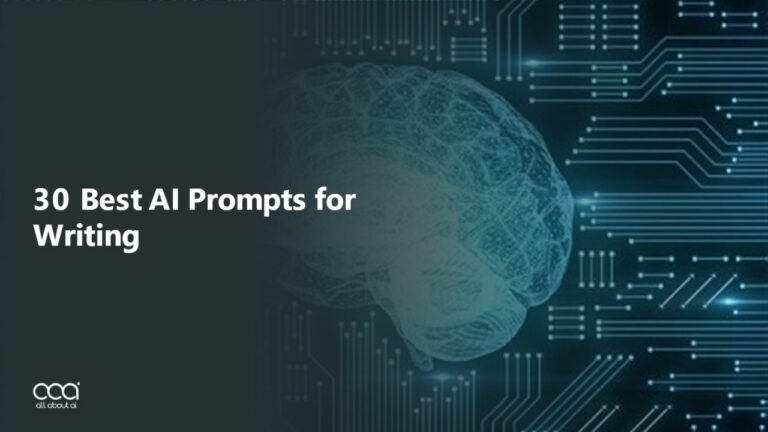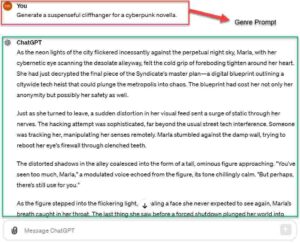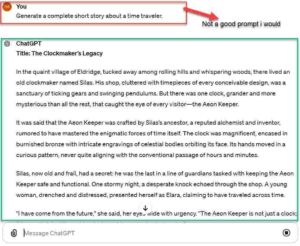Have you ever found yourself frozen in front of a blank screen, your mind as empty as the page before you? You’re not alone. Every writer, from Kiwi novices to literary veterans, grapples with the daunting writer’s block, where words seem to have abandoned you completely.
But what if you could turn the tide in your favor with a little help from Artificial Intelligence? What I am talking about are AI writing prompts, a simple yet transformative tool designed to lift you out of this artistic standstill.
These clever snippets of text are not just prompts; they’re your creative lifeline. They spark ideas, inspire stories, and get your fingers moving across the keyboard again.
AI prompts come with many benefits. They boost creativity, help you write more, and offer a dependable method to overcome writer’s block. Whether you’re an experienced writer or just starting out, AI prompts can truly change the way you approach writing in New Zealand.
What are AI Prompts for Writing?
AI prompts are short text commands that you type into an AI to help it generate text. These prompts act as cues that guide the AI to produce specific types of content. For instance, you might input “Draft a blog post about the latest trends in digital marketing,” and the AI would create content that aligns with that command.
AI prompts like ChatGPT prompts for writing essentially give direction to the AI tool. You provide a prompt to your AI assistant, and it responds with various ideas or even complete pieces of content based on what you asked for. This process helps initiate your writing project quickly and efficiently for the Kiwi audience.
Here are a few more AI prompt examples,
Prompt: “Describe a character who is a retired detective turning to a life of crime due to boredom.”
This prompt helps the AI generate a complex character backstory, which can be used as a central figure in a novel or screenplay, providing depth and conflict to the narrative.

Prompt: “Write about a futuristic tech expo unveiling a breakthrough in artificial intelligence.”
This prompt directs the AI to create a detailed scenario involving advanced technology, which could serve as a setting or a pivotal plot event in a science fiction story or article on tech trends.
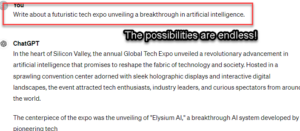
What are the Benefits of Using AI Prompts for Writing?
Generative AI prompts are catalysts for creativity, offering fresh perspectives and sustained momentum in your writing endeavors. Here’s how they can enhance your writing process:
Spark Creativity
AI prompts are like keys that open the treasure troves of your imagination. They compel Kiwi writers to think outside the box and explore pathways you might not consider independently.
Example: If you’re writing a thriller, an AI prompt like “Describe a midnight meeting in a secluded, foggy park” can lead to vivid, intriguing scenarios.
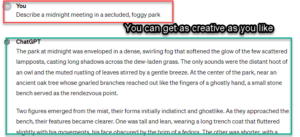
Boost Productivity
With AI prompts, the time spent staring blankly at the screen can be converted into productive writing sessions. These prompts help kiwi writers to maintain a flow of writing, ensuring that your creative output doesn’t hit a wall. Moreover, if you are a teacher you can boost your productivity with AI prompts for teachers.
Example: “Create a scenario in which you have to complete a month’s worth of work in one week. Describe the strategies you would implement to meet this challenging deadline without compromising on quality.”
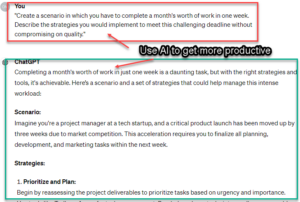
Break Through Writer’s Block
When stuck, an AI prompt can act as a creative defibrillator, shocking your brain back to life.
Example: Stuck on a specific scene in your fantasy novel? Try a prompt like: “Write a dialogue between a powerful wizard and a young apprentice who has just discovered a hidden magical ability.”
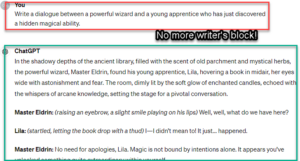
Explore New Genres
AI prompts can gently push you into narrative territories you’ve never ventured before, enriching your writing repertoire.
Example: If you typically write romance, an AI prompt like, “Draft a mystery plot set in a haunted Victorian mansion”, can spark interest in new genres.
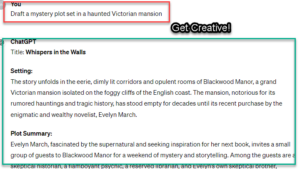
Develop Writing Consistency
Regular use of AI prompts can help establish a routine, making writing a daily habit rather than an occasional endeavor for kiwi users.
How Kiwi WritersUse AI Prompts for Writing Effectively?
To make the most of AI prompts in your writing, it’s important for Kiwi writers to know the right ways to use them. Here are a few simple steps on how to effectively use AI prompts for content writing to improve your writing projects.
Define Your Purpose
It’s crucial for Kiwi Writers to pinpoint exactly what you need from your writing session. Are you looking to flesh out characters, or are you struggling with plot development? Understanding this will guide your prompt creation.
Example Prompt: “Generate character backstory ideas for a retired astronaut who has returned to Earth after discovering a secret alien civilization.”
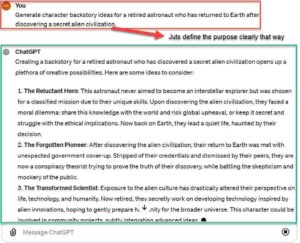
Craft Specific Prompts
The specificity of your prompt directly influences the output’s relevance. Details about the setting, character emotions, or plot twists will lead to more targeted and usable content from the AI.
Example Prompt: “Describe a climactic scene where a hidden door in the old library leads to a secret underground bunker, revealing the town’s forgotten history.”
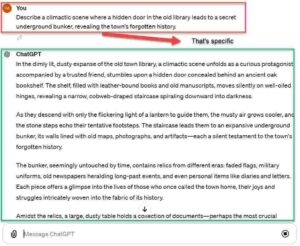
Experiment and Refine
Trial and error play a significant role in finding the perfect prompt for Kiwi users. Don’t hesitate to refine and tweak your prompts based on the responses you get, honing in on what works best for your style and needs.
Initial Prompt: “Write about a winter scene in New Zealand.”

Refined Prompt: “Describe a bustling Christmas market in New Zealand during a snowstorm, focusing on a young couple’s first holiday trip together.”
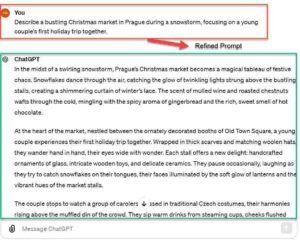
Use AI Prompts as a Springboard
Remember, the AI’s output is just the beginning. Use it as a foundation to build upon and integrate your unique voice and perspective, enhancing the original material.
Example Prompt: “Start a story where an amateur detective solves a minor mystery at a wedding, which later leads to a much larger conspiracy.”
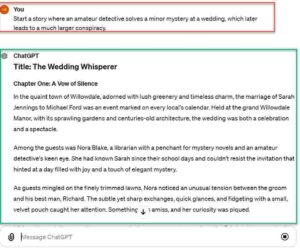
Maintain Your Unique Voice
While AI can provide a fantastic starting point, your personal touch is what will truly resonate with readers. Use AI to aid your creativity, not replace it.
Example Prompt: “Compose a heartfelt poem about loss in the style of Pablo Neruda.”
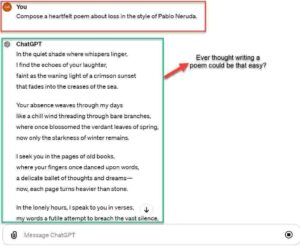
What are the Types of AI Prompts for Writing?
AI prompts for writing come in various forms, each tailored to spark different elements of creative content. Here’s a closer look at some common types:
Character Prompt
Character prompts focus on developing personalities, emotions, and dialogues. They help writers delve into the psychology of their characters by providing situations or emotions for the characters to react to.
Example: “Write a monologue for a retired superhero lamenting their past glory.” This prompt helps explore the character’s emotions and past experiences, adding depth to the character in your story.
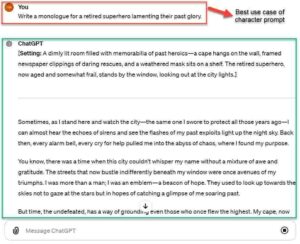
Setting Prompt
Setting prompts encourage detailed descriptions of locations and environments, enhancing the world-building aspect of your narrative. These prompts can transport readers to places that are critical to the story’s atmosphere and plot.
Example: “Describe a busy spaceport on Mars just before a galactic holiday.” It sets the scene for a vibrant and dynamic location, ripe with potential interactions and events.
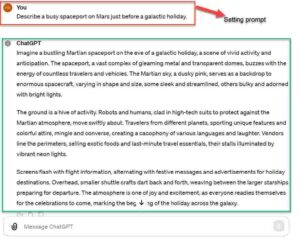
Genre Prompt
Genre prompts are tailored to fit the conventions and styles of specific literary genres, helping writers maintain the tone and elements expected by readers of that genre.
Example: “Generate a suspenseful cliffhanger for a cyberpunk novella.” This type of prompt helps in structuring scenes that align with the thematic elements of the cyberpunk genre, such as advanced technology and urban dystopias.
Action Prompt
Action prompts push the narrative forward by suggesting scenes that require dynamic progression and help in moving the plot. These prompts are great for overcoming stagnation in the storyline.
Example: “Create a scene where the main character must escape from a high-security vault using their wits and available gadgets.” This prompt not only advances the plot but also showcases the character’s ingenuity and resourcefulness.
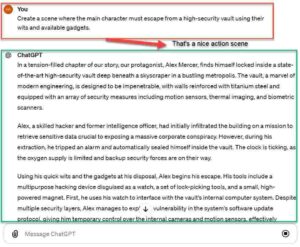
Emotional Prompt
Emotional prompts aim to evoke specific feelings or reactions from the characters, thereby affecting the reader’s emotional engagement with the story.
Example: “Write a dialogue where two old friends reveal long-held secrets to each other during a stormy night.” This setup not only builds tension but also deepens the emotional layers of the characters involved.
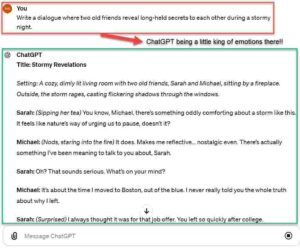
What are the Common Mistakes to Avoid When Using AI Prompts?
When using AI prompts for writing, it’s important for Kiwi writers to be aware of common pitfalls that could hinder your creative process and the quality of your output. Here are some mistakes to watch out for and additional insights on how to avoid them:
Over Reliance on AI
Overusing AI can limit personal creativity and reduce growth opportunities as a writer, as it might make Kiwi writers dependent on artificial outputs for ideas.
For example: “Generate a complete short story about a time traveler.”
Solution: kiwi Writer incorporate AI tools as a part of a broader creative strategy. Use them for initial ideas or when you’re stuck, but ensure to supplement this with regular, personal brainstorming to maintain and develop your creative skills.
For example: “Start a story about a time traveler stuck in medieval times.”
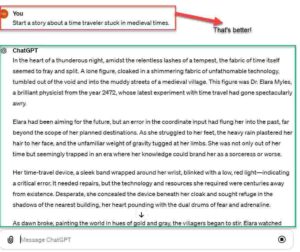
Lack of Specificity in Prompts
When prompts are too general, the AI may produce broad, nonspecific content that might not meet specific creative or editorial needs.
For example: “Write about a dog.”
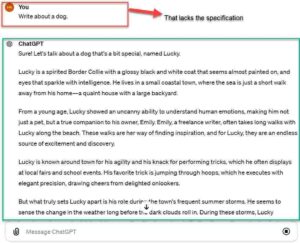
Solution: Refine your prompts by including more detailed descriptions, context, and clear objectives to guide the AI towards producing more targeted and applicable outputs.
For example: “Write a story about a German Shepherd police dog retiring after a decorated career.”
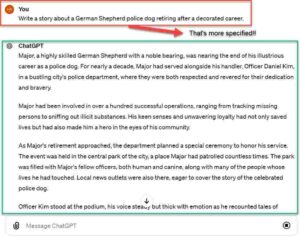
Treating AI Output as Final Drafts
AI-generated content can often be raw and unpolished, requiring further refinement to meet quality standards.
For example: “Create a blog post about climate change.”
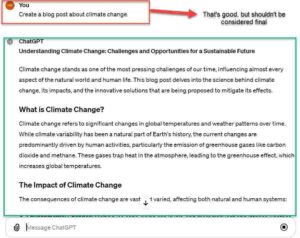
Solution: Always revise the AI-generated drafts. Enhance and personalize this content to ensure it aligns with your voice and fulfills the intended quality and style.
For example: “Revise the AI-generated blog post to include recent statistics and a personal anecdote about witnessing climate change effects firsthand.”
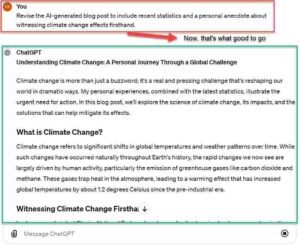
Ignoring Your Unique Voice
Allowing AI to dictate the style and voice of your writing can lead to work that lacks personal flair and fails to stand out among the New Zealand audience.
For example: “Write a blog post on contemporary art styles.”
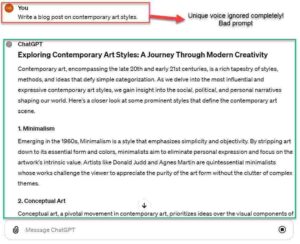
Solution: Kiwi Writers should use AI-generated content as a base to build upon. Make sure to infuse your personal tone and style during revisions to preserve your unique voice in all outputs.
For example: “Integrate personal critique and favorite examples into the AI-generated blog post on contemporary art.”
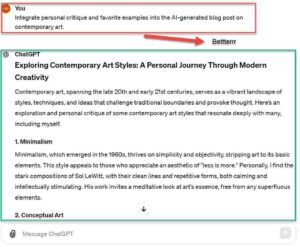
Unethical Use of AI
Improper use of AI, especially concerning originality and intellectual property, can lead to ethical issues.
For example: “Create a story similar to ‘Harry Potter’.”
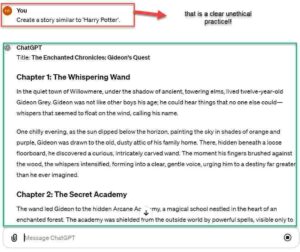
Solution: Use AI ethically by crediting appropriate sources and ensuring that all generated content adheres to intellectual property norms. Avoid using the AI to replicate proprietary content without proper permissions.
For example: “Generate an original story about a young witch in a modern urban setting, ensuring no overlap with existing copyrighted stories.”
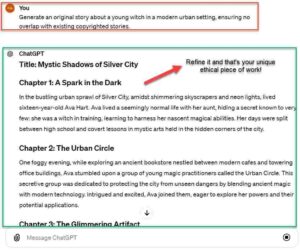
Not Double-Checking AI Data
AI might provide incorrect or fabricated data, especially in areas requiring accuracy and factual correctness.
For example: “Write an article on the success rates of startups in Silicon Valley.”
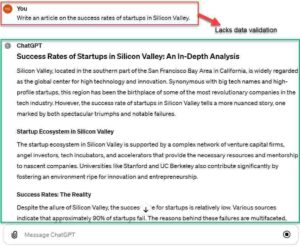
Solution: Verify the accuracy of data and facts provided by AI with trusted sources before publication to maintain credibility and accuracy in your content. For example,
For example: “Check the latest data on startup success rates and update the AI-generated article accordingly.”
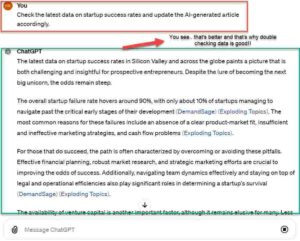
Not Tailoring Content to the Audience
AI may not fully understand the cultural and contextual nuances of your target audience, potentially leading to generic or inappropriate content.
For example: “Write a promotional piece for a cricket equipment sale in New Zealand.”

Solution: Adapt AI-generated content to fit the cultural and demographic specifics of your audience. This might include modifying language, examples, and cultural references to better connect with your readers. For example,
For example: “Modify the promotion to include basic explanations of cricket and comparisons with similar Kiwi sports like baseball.”
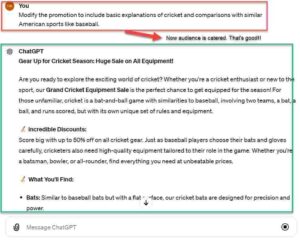
What are the Types of AI Writing Tools to Explore Alongside Prompts?
Exploring various AI writing tools alongside prompts can significantly enhance the writing process, making it more efficient and creative. These tools offer diverse functionalities, from generating content and ideas to refining grammar and style, each designed to support different aspects of writing and research.
Here are a few best AI writing tools for Kiwi Writers you can explore.
AI Story Completion Tools
| NovelAI | Expands narrative sections based on initial input, useful for developing complex stories. |
| ShortlyAI | Ideal for getting directional inspiration for plots and scenes. |
| Inkarnate | Assists in creating rich, immersive worlds by providing visual storytelling elements alongside textual content. |
| Sudowrite | Offers brainstorming features and thematic suggestions to enhance narrative development. |
AI Grammar Checkers
| Grammarly | Provides advanced grammar, punctuation, and style suggestions to polish your writing. |
| ProWritingAid | Delivers detailed reports that focus on improving readability, style, and grammar. |
| Ginger Software | Helps correct grammar mistakes and rephrase sentences to improve clarity. |
| Hemingway Editor | Highlights complex sentences and common errors, aiming for clearer, simpler writing. |
AI Paraphrasing and Rewriting Tools
| QuillBot | Rephrases sentences while maintaining the original meaning, useful for avoiding plagiarism. |
| Wordtune | Refines sentence structure and word choice to improve flow and readability. |
| SpinnerChief | Helps rewrite articles to create unique content quickly and efficiently. |
| Paraphraser.io | Offers several modes for rewriting text, including fluency, standard, and creative options. |
AI Research and Topic Exploration Tools
| Evernote Web Clipper | Capture and organize research materials from the web, streamlining the writing process. |
| Feedly | Keep up with trending topics and recent articles in your genre for inspiration. |
| Mendeley | A reference manager and academic social network that is great for academic writers to store and share research. |
| Zotero | Helps collect, organize, cite, and share research sources, especially useful for scholarly and data-driven writing. |
AI Character Generators
| CharaHub | Excellent for developing detailed character backstories and maintaining organized profiles. |
| RPG Generator | Useful for creating complex character profiles, ideal for novelists and game designers. |
| Plot Generator | Generates random characters, settings, and plots to provide a starting point for storytelling. |
| Springhole | Offers a variety of creative generators that assist in developing character quirks, backgrounds, and motivations. |
Each of these tools can be tailored to suit different aspects of the writing process, from idea generation to research and editing. By leveraging these AI tools, writers can significantly enhance their productivity, creativity, and writing quality.
FAQS
What are three types of AI prompting?
How to humanize AI content?
How to write a good ChatGPT prompt?
Wrap up
AI prompts for writing are invaluable tools that can transform your writing process, igniting creativity, enhancing productivity, and overcoming writer’s block.
By providing direction and inspiration, these prompts help you explore new genres, develop compelling characters, and maintain a unique voice. Grab this technology to make your writing journey smoother and more creative.

